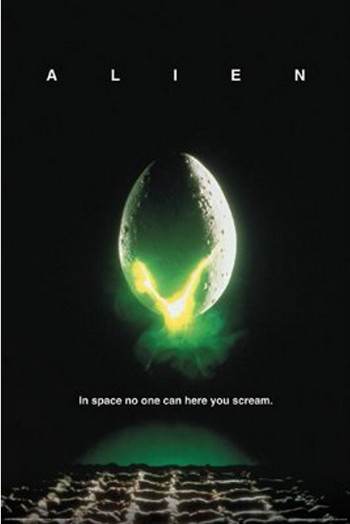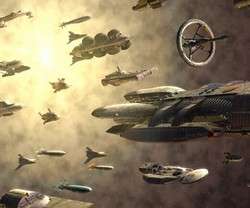
Space Age Mythology Revisited
by Sylvia Engdahl
My series The New Mythology of the Space Age, which has been online at my website since 2003, consists of my “lectures” for the online course on “Science Fiction and Space Age Mythology” that I taught in the early nineties through Connected Education for graduate Media Studies credit from the New School for Social Research. Most of it is still current. The portions dealing with the origin and function of myth, the mythic nature of pop-culture science fiction as distinguished from literary science fiction, and why it can be viewed as the developing mythology of our era would not be different if I wrote them today. Nor would I change the discussions of specific SF films or other space-related topics. But there is one respect in which the series is outdated. In the early nineties I placed emphasis on the optimism of space fiction as opposed to earthbound science fiction. That generalization no longer holds true.
by Sylvia Engdahl
My series The New Mythology of the Space Age, which has been online at my website since 2003, consists of my “lectures” for the online course on “Science Fiction and Space Age Mythology” that I taught in the early nineties through Connected Education for graduate Media Studies credit from the New School for Social Research. Most of it is still current. The portions dealing with the origin and function of myth, the mythic nature of pop-culture science fiction as distinguished from literary science fiction, and why it can be viewed as the developing mythology of our era would not be different if I wrote them today. Nor would I change the discussions of specific SF films or other space-related topics. But there is one respect in which the series is outdated. In the early nineties I placed emphasis on the optimism of space fiction as opposed to earthbound science fiction. That generalization no longer holds true.*
“One of the outstanding things about major space films,” I stated, “is that with only a few exceptions they are optimistic, often even uplifting. In a world that many people perceive as depressing and/or terrifying, they are an island of light.” Unfortunately I cannot say that anymore. This is not surprising since all mythology is an expression of a culture’s perception of its relationship to its environment—the total universe of which it is aware, not just “the environment” in the sense of our planet’s biosphere. And as I explained in my essay Confronting the Universe in the Twenty-First Century, people are now less eager to confront the regions beyond Earth than they were before the reality of our contact with them sunk in.
I believe this is the reason for the decline in the public’s interest in real-life space activity—the prospect of meeting new and perhaps frightening things in the wider universe is no longer an abstraction. When going there was viewed as mere speculation it held wide appeal, but once it became clear that our world is not isolated—that we may actually venture forth or be visited by non-humans—then an undercurrent of uneasiness seems to have pervaded the collective unconscious. Though a small minority is as enthusiastic about humanity’s future in space as ever, the general public has begun to have second thoughts.
Is this why some people now claim the Apollo moon landings never happened? The growing phenomenon of moon landing denial is indisputably part of space age mythology today. It’s usually dismissed as just another conspiracy theory based on people’s lack of trust in the government, but I think it has deeper significance. People believe what they want to believe. And evidently a lot of them, underneath, don’t want to believe that humankind is in the verge of breaking away from the security of the familiar planet where it evolved.

Be that as it may, popular fiction about space is not as optimistic as is used to be, and that is not an accident. Mythology reflects the prevailing perceptions of a culture; it does not create them. In the mythic sense, both the highest aspirations and the deepest fears of our era are inevitably focused on exploration of space or visitation from space, which is natural since we are newly aware that accessible space surrounds our world, whether or not we like the idea. If this situation did not evoke a new mythology, as awareness of unknown lands and seas evoked the mythologies of ancient times, it would be very surprising indeed. And the changing content of that mythology can reveal much about how public perceptions of space are shifting.
The former prevalence of optimism in space films was not without exceptions. These, among major space films that attracted large audiences, were Alien and its sequels, Outland, and Total Recall. (The latter doesn't really count as a space film, as although set on Mars, it was not about life on Mars but about memory implantation; and its locale was a mere framework for a violent action movie.) At the time of its release I was upset by Alien because I felt it wouldn’t do the space program any good, but on reflection, I realized that all mythology deals with the dark side of a culture’s perceptions. There have always been monsters in strange lands, for people need to confront not only their aspirations concerning new environments, but their deep unconscious fears. Furthermore, perhaps the universe does contain species as dangerous to ours as the one in Alien. That possibility must be recognized. Real mythology, as distinguished from propaganda, doesn’t gloss over life’s perils—not all of which can be reduced to neat wrap-ups in the Captain’s Log.
Outland’s status was a bit more dubious, and despite its technically-realistic portrayal of space, it’s by no means certain that it should be considered part of Space Age mythology. It was really a Western in futuristic costume, patterned after High Noon. But whereas people found High Noon emotionally satisfying and perceived it as a triumph of good over evil, I can’t recall hearing any such reaction to Outland. And the reason, I think, was that it was a hybrid form. It was based not on mythopoeically-derived vision but on mere projection (High Noon, by contrast, was set in the mythic Old West.) Projections of current trends are not a valid basis for space fantasy, or for that matter, for serious futurism—and mythopoeic thought recognizes this in a way that logical thought does not. Audiences didn’t feel that people who colonize new worlds will live like those in Outland; underneath they perceived the incongruity of its premises. In any case, public reaction proves the universe of the Star Trek and Star Wars films to have been more “true” in the eyes of our culture than that of Outland, even though the technology shown in the latter was far closer to what we know of scientific fact.

But the year after I last taught the course, the tide of optimism about space began to turn with the blockbuster Independence Day, the highest-grossing film of 1996. There had, of course, been many alien invasion films in the past, especially in the 1950s, but these, mostly B movies featuring BEMs (“bug-eyed monsters”), were viewed as pure fantasy or horror and weren’t taken seriously. The V-2 rockets of World War II had raised the theoretical possibility of threats from space, but people didn’t connect their unconscious fear of an unfriendly universe with real life. Not until space travel become a reality did they begin to feel such threats might actually exist. To be sure, Independence Day was optimistic in the sense that the good guys won; it reassured audiences that in the face of a horrific attack humans would be victorious. Nevertheless it portrayed extraterrestrials as both powerful and fearsome. So too did a number of other popular alien invasion films that followed it, such as War of the Worlds and the TV series Falling Skies.
In the seventies and eighties there were many major movies that portrayed aliens as friendly—E.T., Close Encounters, Starman, Cocoon, and The Abyss, among others, As late as 1995 Contact did so. In the twenty-first century, however, there have been only two that I know of—Avatar (which I don’t consider optimistic because it implies humans will do harm to alien worlds) and 2016’s Arrival.
As for movies about humans in space, almost all the recent ones suggest that it’s not a good place to be. The Martian is the only upbeat film among them, and even that is about escaping from the inhospitable conditions of Mars rather than improving them. Gravity, a beautiful, accurately envisioned film about near-Earth space flight, gives the impression that the dangers are too great to justify leaving the ground. Interstellar portrays space travel as necessary for escape from a devastated Earth, but by no means pleasant. Europa Report shows a scientific space mission as involving sacrifice to the exclusion of the joy and wonder of discovery.
It’s not that these aren’t good movies, or that they’re not realistic—on the contrary, they are. Space missions are indeed dangerous. But in the past space exploration was seen as a thrilling adventure, one in which audiences felt participation would be worth the risk. There was no lack of danger in Star Trek, yet viewers wished they could travel aboard the Enterprise.
Even the recent Star Trek films, however, lack the outlook that made people want “to explore strange new worlds, to seek out new life and new civilizations, to boldly go where no one has gone before.” They have become mere action/adventure films, essentially no more inspiring than those that don’t happen to take place in space. The same can be said of Star Wars, which lost its mythological significance in the three unsuccessful “prequel” movies and does not seem to have gotten it back in the new trilogy. Then too, the TV series Firefly, which was clearly mythic and gained a strong following among people who still think space travel will be fun, was followed by a much darker movie sequel, Serenity, that disappointed many of its fans. Where is the spirit of excitement and hope that once characterized space fiction?

That spirit has faded because, as I’ve said above, myth reflects the feelings of the culture that gives rise to it. And if specific evidence of our culture’s withdrawal from space exploration is needed, we have only to look at the conclusion of the 2004-2009 version of Battlestar Galactica, in which the protagonists, after long years in space, destroy their technology by sending their starships into the sun and commit to a low-tech lifestyle, confined to a pastoral planet (ultimately revealed to be prehistoric Earth) where in reality they'd be unlikely to survive. As far as I can see on the Web, few people were dismayed by that aspect of the finale; many of them liked it and viewed it as a happy ending. There could be no clearer symbol of our collective retreat from the universe beyond our world.
All in all, Space Age mythology is revealing the current outlook of our society, as mythologies always do, and is bearing out what I said in “Confronting the Universe in the Twenty-First Century.” Hard though it is for space advocates to accept, it’s going to be a long time before the public comes to terms with the fact that Earth is open to contact with the strange and sometimes-terrifying regions beyond.
*
For more commens about this, see my new postscript to the original Space Age Mythology seriesCopyright 1995, 2017 by Sylvia Engdahl
All rights reserved.
This essay is included in my ebook The Future of Being Human and Other Essays
tHr